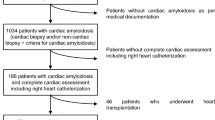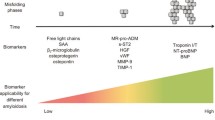Abstract
Purpose of Review
Light chain (AL) amyloidosis can cause an infiltrative cardiomyopathy that can result in symptomatic heart failure. The vague, nonspecific onset of signs and symptoms may lead to a delay in diagnosis and treatment leading to poor outcomes. Cardiac biomarkers, such as troponins and natriuretic peptides, play a pivotal role in diagnosis, determining prognosis, and assessing treatment response in patients with AL amyloidosis. Because of the evolving landscape for both diagnosis and treatment of AL cardiac amyloidosis, we review the critical role these and other biomarkers play in the clinical management of this disease.
Recent Findings
A number of conventional cardiac and noncardiac serum biomarkers are commonly used in AL cardiac amyloidosis and may be surrogates for cardiac involvement and inform prognosis. These include typical heart failure biomarkers such as levels of circulating natriuretic peptides as well as cardiac troponins. Other noncardiac biomarkers frequently measured in AL cardiac amyloidosis included difference between the involved and uninvolved free light chains (dFLC) and markers of endothelial cell activation and damage such as von Willebrand factor antigen and matrix metalloproteinases.
Summary
AL amyloidosis can lead to cardiac involvement which has been associated with poor outcomes, especially if not identified and treated early. Natriuretic peptides and cardiac troponins are cornerstones for the diagnosis and management of AL cardiac amyloidosis. Their levels may represent cardiac stress, injury, and possibly degree of cardiac involvement, and they play a key role in AL amyloidosis disease staging.

Similar content being viewed by others
References
Fotiou D, Theodorakakou F, Kastritis E. Biomarkers in AL amyloidosis. Int J Mol Sci. 2021;22(20):10916.
Falk RH, Alexander KM, Liao R, Dorbala S. AL (Light-Chain) Cardiac amyloidosis: a review of diagnosis and therapy. J Am Coll Cardiol. 2016;68(12):1323–41.
Tahir UA, Doros G, Kim JS, Connors LH, Seldin DC, Sam F. Predictors of mortality in light chain cardiac amyloidosis with heart failure. Sci Rep. 2019;9(1):8552.
Hall C. Essential biochemistry and physiology of (NT-pro)BNP. Eur J Heart Fail. 2004;6(3):257–60.
Vuolteenaho O, Ala-Kopsala M, Ruskoaho H. BNP as a biomarker in heart disease. Adv Clin Chem. 2005;40:1–36.
Kimishima Y, Yoshihisa A, Kiko T, Yokokawa T, Miyata-Tatsumi M, Misaka T, et al. Utility of B-type natriuretic peptide for detecting cardiac involvement in immunoglobulin amyloidosis. Int Heart J. 2019;60(5):1106–12.
Mueller C, McDonald K, de Boer RA, Maisel A, Cleland JGF, Kozhuharov N, et al. Heart Failure Association of the European Society of Cardiology practical guidance on the use of natriuretic peptide concentrations. Eur J Heart Fail. 2019;21(6):715–31.
Palladini G, Foli A, Milani P, Russo P, Albertini R, Lavatelli F, et al. Best use of cardiac biomarkers in patients with AL amyloidosis and renal failure. Am J Hematol. 2012;87(5):465–71.
Lilleness B, Doros G, Ruberg FL, Sanchorawala V. Establishment of brain natriuretic peptide - based criteria for evaluating cardiac response to treatment in light chain (AL) amyloidosis. Br J Haematol. 2020;188(3):424–7.
Nishikimi T, Maeda N, Matsuoka H. The role of natriuretic peptides in cardioprotection. Cardiovasc Res. 2006;69(2):318–28.
Palladini G, Campana C, Klersy C, Balduini A, Vadacca G, Perfetti V, et al. Serum N-terminal pro-brain natriuretic peptide is a sensitive marker of myocardial dysfunction in AL amyloidosis. Circulation. 2003;107(19):2440–5.
Merlini G, Lousada I, Ando Y, Dispenzieri A, Gertz MA, Grogan M, et al. Rationale, application and clinical qualification for NT-proBNP as a surrogate end point in pivotal clinical trials in patients with AL amyloidosis. Leukemia. 2016;30(10):1979–86.
Maurer MS, Dunnmon P, Fontana M, Quarta CC, Prasad K, Witteles RM, et al. Proposed cardiac end points for clinical trials in immunoglobulin light chain amyloidosis: report from the Amyloidosis Forum Cardiac Working Group. Circ Heart Fail. 2022;15(6):e009038.
Sharma S, Jackson PG, Makan J. Cardiac troponins. J Clin Pathol. 2004;57(10):1025–6.
Dispenzieri A, Gertz MA, Kyle RA, Lacy MQ, Burritt MF, Therneau TM, et al. Serum cardiac troponins and N-terminal pro-brain natriuretic peptide: a staging system for primary systemic amyloidosis. J Clin Oncol. 2004;22(18):3751–7.
Dispenzieri A, Gertz MA, Kumar SK, Lacy MQ, Kyle RA, Saenger AK, et al. High sensitivity cardiac troponin T in patients with immunoglobulin light chain amyloidosis. Heart. 2014;100(5):383–8.
Kristen AV, Giannitsis E, Lehrke S, Hegenbart U, Konstandin M, Lindenmaier D, et al. Assessment of disease severity and outcome in patients with systemic light-chain amyloidosis by the high-sensitivity troponin T assay. Blood. 2010;116(14):2455–61.
Nicol M, Baudet M, Brun S, Harel S, Royer B, Vignon M, et al. Diagnostic score of cardiac involvement in AL amyloidosis. Eur Heart J Cardiovasc Imaging. 2020;21(5):542–8.
Mohty D, Damy T, Cosnay P, Echahidi N, Casset-Senon D, Virot P, et al. Cardiac amyloidosis: updates in diagnosis and management. Arch Cardiovasc Dis. 2013;106(10):528–40.
Liu JE, Barac A, Thavendiranathan P, Scherrer-Crosbie M. Strain Imaging in Cardio-Oncology. JACC Cardio Oncol. 2020;2(5):677–89.
Apridonidze T, Steingart RM, Comenzo RL, Hoffman J, Goldsmith Y, Bella JN, et al. Clinical and echocardiographic correlates of elevated troponin in amyloid light-chain cardiac amyloidosis. Am J Cardiol. 2012;110(8):1180–4.
Agha AM, Palaskas N, Patel AR, DeCara J, Parwani P, Iliescu C, et al. Cardiac magnetic resonance predicting outcomes among patients at risk for cardiac AL amyloidosis. Front Cardiovasc Med. 2021;8:626414.
Kazman P, Absmeier RM, Engelhardt H, Buchner J. Dissection of the amyloid formation pathway in AL amyloidosis. Nat Commun. 2021;12(1):6516.
Kumar S, Dispenzieri A, Lacy MQ, Hayman SR, Buadi FK, Colby C, et al. Revised prognostic staging system for light chain amyloidosis incorporating cardiac biomarkers and serum free light chain measurements. J Clin Oncol. 2012;30(9):989–95.
Palladini G, Dispenzieri A, Gertz MA, Kumar S, Wechalekar A, Hawkins PN, et al. New criteria for response to treatment in immunoglobulin light chain amyloidosis based on free light chain measurement and cardiac biomarkers: impact on survival outcomes. J Clin Oncol. 2012;30(36):4541–9.
Czyżewska E, Wiśniewska A, Waszczuk-Gajda A, Ciepiela O. The role of light kappa and lambda chains in heart function assessment in patients with AL amyloidosis. J Clin Med. 2021;10(6):1274.
Kastritis E, Papassotiriou I, Terpos E, Roussou M, Gavriatopoulou M, Komitopoulou A, et al. Clinical and prognostic significance of serum levels of von Willebrand factor and ADAMTS-13 antigens in AL amyloidosis. Blood. 2016;128(3):405–9.
Pudusseri A, Sanchorawala V, Sloan JM, Bever KM, Doros G, Kataria S, et al. Prevalence and prognostic value of D-dimer elevation in patients with AL amyloidosis. Am J Hematol. 2019;94(10):1098–103.
Abdelaziz Mohamed I, Gadeau AP, Hasan A, Abdulrahman N, Mraiche F. Osteopontin: a promising therapeutic target in cardiac fibrosis. Cells. 2019;8(12):1558.
Rosenberg M, Zugck C, Nelles M, Juenger C, Frank D, Remppis A, et al. Osteopontin, a new prognostic biomarker in patients with chronic heart failure. Circ Heart Fail. 2008;1(1):43–9.
Kyle RA, Bayrd ED. Amyloidosis: review of 236 cases. Medicine. 1975;54(4):271–99.
Gertz MA. Immunoglobulin light chain amyloidosis: 2020 update on diagnosis, prognosis, and treatment. Am J Hematol. 2020;95(7):848–60.
Al Hamed R, Bazarbachi AH, Bazarbachi A, Malard F, Harousseau JL, Mohty M. Comprehensive review of AL amyloidosis: some practical recommendations. Blood Cancer J. 2021;11(5):97.
Sanchorawala V, Shelton AC, Lo S, Varga C, Sloan JM, Seldin DC. Pomalidomide and dexamethasone in the treatment of AL amyloidosis: results of a phase 1 and 2 trial. Blood. 2016;128(8):1059–62.
Muchtar E, Gertz MA, Lacy MQ, Go RS, Buadi FK, Dingli D, et al. Ten-year survivors in AL amyloidosis: characteristics and treatment pattern. Br J Haematol. 2019;187(5):588–94.
Gertz MA, Lacy MQ, Dispenzieri A, Kumar SK, Dingli D, Leung N, et al. Refinement in patient selection to reduce treatment-related mortality from autologous stem cell transplantation in amyloidosis. Bone Marrow Transplant. 2013;48(4):557–61.
Minnema MC, Dispenzieri A, Merlini G, Comenzo RL, Kastritis E, Wechalekar AD, et al. Outcomes by cardiac stage in patients with newly diagnosed AL amyloidosis: phase 3 ANDROMEDA trial. JACC Cardio Oncol. 2022;4(4):474–87.
Dispenzieri A, Dingli D, Kumar SK, Rajkumar SV, Lacy MQ, Hayman S, et al. Discordance between serum cardiac biomarker and immunoglobulin-free light-chain response in patients with immunoglobulin light-chain amyloidosis treated with immune modulatory drugs. Am J Hematol. 2010;85(10):757–9.
Edwards CV, Rao N, Bhutani D, Mapara M, Radhakrishnan J, Shames S, et al. Phase 1a/b study of monoclonal antibody CAEL-101 (11-1F4) in patients with AL amyloidosis. Blood. 2021;138(25):2632–41.
Author information
Authors and Affiliations
Corresponding author
Ethics declarations
Conflict of Interest
JLG: consulting: Pfizer, Eidos/BridgeBio, Alnlyam, Intellia, Sarepta, and AstraZeneca; grant support: Pfizer 67656485, Eidos/BridgeBio, Texas Health Resources Clinical Scholarship, and NHLBI R01 HL160892-01A1. GK: consulting/honoraria: BMS, Janssen, Sanofi, Arcellx, Kedrion, Pfizer; research funding: BMS, Janssen, and Abbvie.
Human and Animal Rights and Informed Consent
This article does not contain any studies with human or animal subjects performed by any of the authors.
Additional information
Publisher’s Note
Springer Nature remains neutral with regard to jurisdictional claims in published maps and institutional affiliations.
Rights and permissions
Springer Nature or its licensor (e.g. a society or other partner) holds exclusive rights to this article under a publishing agreement with the author(s) or other rightsholder(s); author self-archiving of the accepted manuscript version of this article is solely governed by the terms of such publishing agreement and applicable law.
About this article
Cite this article
Wees, I., Hendren, N.S., Kaur, G. et al. Natriuretic Peptides and Cardiac Troponins: Markers of Disease Progression and Risk in Light Chain Cardiac Amyloidosis. Curr Heart Fail Rep 20, 350–357 (2023). https://doi.org/10.1007/s11897-023-00616-y
Accepted:
Published:
Issue Date:
DOI: https://doi.org/10.1007/s11897-023-00616-y




